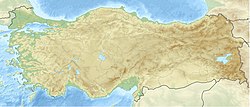
Istanbul
Largest city in Turkey / From Wikipedia, the free encyclopedia
Dear Wikiwand AI, let's keep it short by simply answering these key questions:
Can you list the top facts and stats about Istanbul?
Summarize this article for a 10 years old
Istanbul (/ˌɪstænˈbʊl/ IST-an-BUUL,[7][8] US also /ˈɪstænbʊl/ IST-an-buul; Turkish: İstanbul [isˈtanbuɫ] ⓘ), formerly known as Constantinople[lower-alpha 2] (Greek: Κωνσταντινούπολις; Latin: Constantinopolis; Ottoman Turkish: قسطنطينيه Kostantiniye), is the largest city in Turkey, serving as the country's economic, cultural and historic hub. The city straddles the Bosporus strait, lying in both Europe and Asia, and has a population of over 15 million residents, comprising 19% of the population of Turkey.[4] Istanbul is the most populous European city[lower-alpha 3] and the world's 15th-largest city.
Istanbul
İstanbul | |
|---|---|
| Coordinates: 41°00′49″N 28°57′18″E | |
| Country | |
| Region | Marmara |
| Province | Istanbul |
| Provincial seat[lower-alpha 1] | Cağaloğlu, Fatih |
| Districts | 39 |
| Government | |
| • Type | Mayor–council government |
| • Body | Municipal Council of Istanbul |
| • Mayor | Ekrem İmamoğlu (CHP) |
| Area | |
| • Urban | 2,576.85 km2 (994.93 sq mi) |
| • Metro | 5,343.22 km2 (2,063.03 sq mi) |
| Highest elevation | 537 m (1,762 ft) |
| Population (31 December 2022)[4] | |
| • Metropolitan municipality and province | 15,907,951 |
| • Rank | 1st in Turkey
1st in Europe |
| • Urban | 15,569,856 |
| • Urban density | 6,042/km2 (15,650/sq mi) |
| • Metro density | 2,977/km2 (7,710/sq mi) |
| Demonym(s) | Istanbulite (Turkish: İstanbullu) |
| Time zone | UTC+3 (TRT) |
| Postal code | 34000 to 34990 |
| Area codes | +90 212 (European side) +90 216 (Asian side) |
| Vehicle registration | 34 |
| GDP (Nominal) | 2021[5] |
| - Total | US$ 248 billion |
| - Per capita | US$ 15,666 |
| HDI (2019) | 0.846[6] (very high) · 1st |
| GeoTLD | .ist, .istanbul |
| Website | |
| Official name | Historic Areas of Istanbul |
| Criteria | Cultural: (i)(ii)(iii)(iv) |
| Reference | 356bis |
| Inscription | 1985 (9th Session) |
| Extensions | 2017 |
| Area | 765.5 ha (1,892 acres) |
The city was founded as Byzantium (Greek: Βυζάντιον, Byzantion) in the 7th century BCE by Greek settlers from Megara.[9] In 330 CE, the Roman emperor Constantine the Great made it his imperial capital, renaming it first as New Rome (Greek: Νέα Ῥώμη, Nea Rhomē; Latin: Nova Roma)[10] and then as Constantinople (Constantinopolis) after himself.[10][11] In 1930, the city's name was officially changed to Istanbul, the Turkish rendering of εἰς τὴν Πόλιν (romanized: eis tḕn Pólin; 'to the City'), the appellation Greek speakers used since the 11th century to colloquially refer to the city.[10]
The city served as an imperial capital for almost 1600 years: during the Roman/Byzantine (330–1204), Latin (1204–1261), late Byzantine (1261–1453), and Ottoman (1453–1922) empires.[12] The city grew in size and influence, eventually becoming a beacon of the Silk Road and one of the most important cities in history. The city played a key role in the advancement of Christianity during Roman/Byzantine times, hosting four of the first seven ecumenical councils before its transformation to an Islamic stronghold following the Fall of Constantinople in 1453 CE—especially after becoming the seat of the Ottoman Caliphate in 1517.[13] In 1923, after the Turkish War of Independence, Ankara replaced the city as the capital of the newly formed Republic of Turkey.
Over 13.4 million foreign visitors came to Istanbul in 2018, eight years after it was named a European Capital of Culture, making it the world's eighth most visited city.[14] The historic centre of Istanbul is a UNESCO World Heritage Site, and the city hosts the headquarters of numerous Turkish companies, accounting for more than thirty percent of the country's economy.[15][16]
.jpeg/268px-Bosphorus_Bridge_(235499411).jpeg)
_(cropped).jpg/159px-Aya_Sophia_(7144824757)_(cropped).jpg)




.jpg/132px-Istanbul_Tram_(2).jpg)



